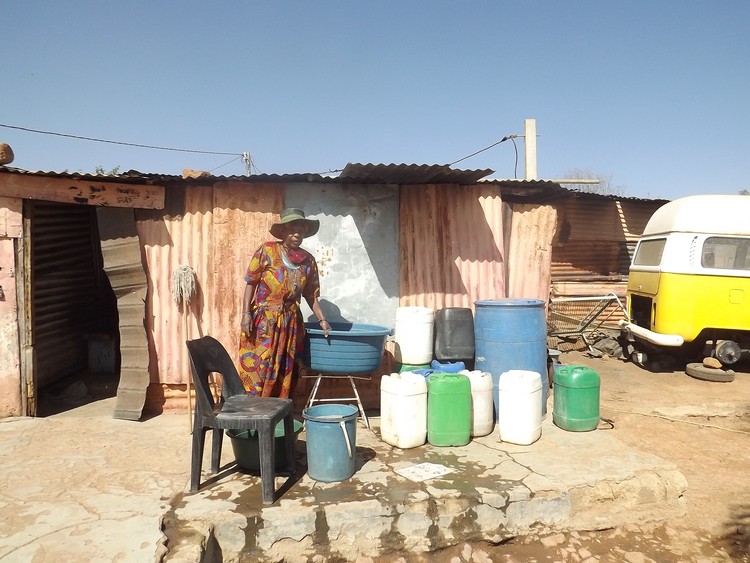In this village you only get tap water on Fridays
An Mpumalanga municipality says it has a shortfall of nearly 60-million litres of water per day.
Moloto resident Josephine Mnguni stands next to the empty water containers she keeps outside her house because the area, under the Thembisile Hani Local Municipality, only gets running water on Fridays. Photo: Warren Mabona
- The community of Moloto in Mpumalanga gets water in their taps for a few hours on Fridays.
- Households say that while the municipality sends trucks to fill two tanks once a week, it is not enough for every household in the village. This means many people have to buy water privately.
- Moloto village falls under the Thembisile Hani Local Municipality which receives its bulk water supply from the City of Tshwane.
- The local municipality says it doesn’t get enough bulk water to supply all of its areas consistently with a shortfall of about 59-million litres of water per day.
- Rand Water failed to respond to our request for comment.
Taps in Moloto Village in Mpumalanga are dry on most days except for a few hours on Fridays. Households say that while the municipality sends tankers to fill two tanks once a week, it is not enough for every household in the village. They say their water troubles have been ongoing for years now.
Residents like Josephine Sebola complain that they spend up to R400 to buy water a month.
Sebola lives with her five children in Moloto Block 15, which she described as the section hardest hit by the water shortages.
She said her tap is always dry, so she buys water from other residents who have drilled boreholes in their yards. But on Fridays the tap in her yard gets water, for about two hours. “I cannot even fill all my containers within those two hours because the flow of water from the tap is slow,” she said.
Another resident Sina Sikhosana of Block 14 said she cannot fill her 100-litre water tank in her yard on Fridays due to the low water pressure. “Water trucks that are sent by the municipality do not even come to this side,” she said.
Kgomotso Mokwana runs a small car wash business in Block 7. He said he spends R150 every month to buy 1,000-litres of water for his business.
“My business makes a little profit every month because it seems I work for water … We reported this water supply problem to the municipality many times, but they always tell us about broken pipes. They [municipality] must fix those broken pipes so that we can get water from our taps like residents in other villages,” said Mokwana.
Moloto village falls under the Thembisile Hani Local Municipality which receives its bulk water supply from the City of Tshwane.
According to the City’s spokesperson Lidela Mashigo, the Thembisile Hani Local Municipality is supplied through its Bronkhorstspruit water treatment plant.
He said the plant is currently unable to fully supply water due to maintenance challenges.
Mashigo said ultimately Thembisile Hani Local Municipality is responsible for supplying its own areas.
Meanwhile, Thembisile Hani Local Municipality spokesperson Simphiwe Mokako confirmed that households in Moloto get water on Fridays. She blamed the water shortage in certain areas in Moloto on “insufficient bulk water supply from the City of Tshwane” as well as “the routine maintenance of water supply infrastructure performed by Rand Water last month”.
Mokako said that the Thembisile Hani Local Municipality has a contract with the City of Tshwane to get about 16-million litres of water per day, but the municipality only receives 0.4-million litres.
In total, the municipality gets about 40-million litres of water per day from the City of Tshwane, Rand Water and Bundu Water Treatment Works. This results in a shortfall of 59-million litres of water per day.
Mokako said the municipality sends 52 water tankers to Moloto to deliver 18,000 litres of water per week. A groundwater protocol study conducted in 2019, reported that there were about 17,500 households in Moloto.
“The municipality is working on resuscitating its Moloto Groundwater (borehole) Scheme in order to augment the shortfall experienced and improve supply capacity in the area to a minimum of three days per week,” said Mokako.
Questions sent to Rand Water’s spokesperson on 15 August went unanswered by the time of publication.
Support independent journalism
Donate using Payfast

Don't miss out on the latest news
We respect your privacy, and promise we won't spam you.
© 2024 GroundUp. This article is licensed under a Creative Commons Attribution-NoDerivatives 4.0 International License.
You may republish this article, so long as you credit the authors and GroundUp, and do not change the text. Please include a link back to the original article.
We put an invisible pixel in the article so that we can count traffic to republishers. All analytics tools are solely on our servers. We do not give our logs to any third party. Logs are deleted after two weeks. We do not use any IP address identifying information except to count regional traffic. We are solely interested in counting hits, not tracking users. If you republish, please do not delete the invisible pixel.

